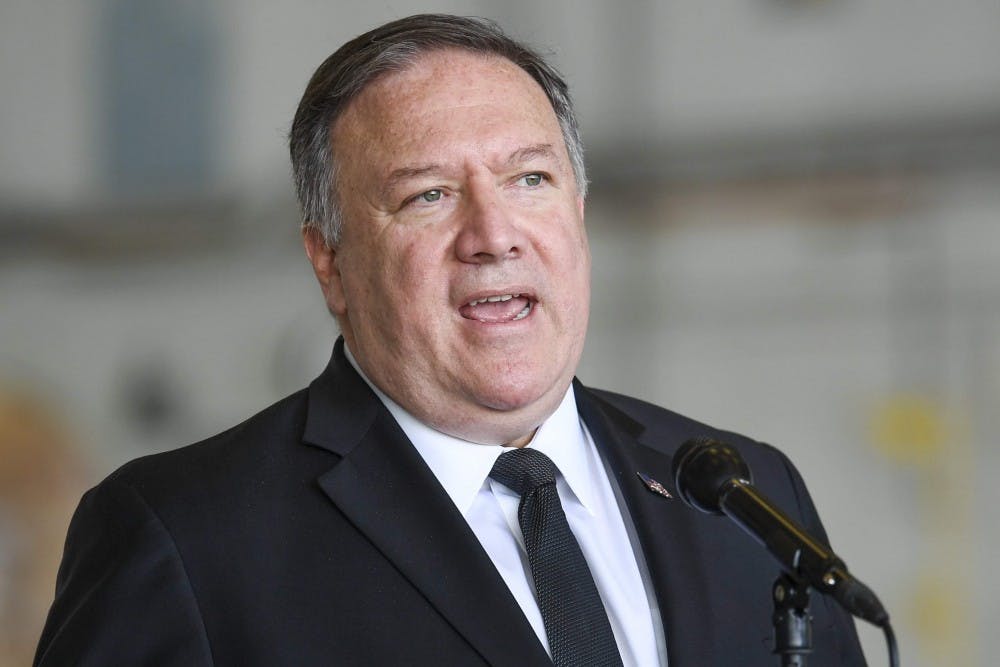The longstanding United States policy against negotiating with terrorist organizations stands as a gesture in support of global human rights and the protection of democratic principles enjoyed in the U.S. yet is undermined by terror entities around the globe.
While this policy should be a guide for policymakers and leaders of the U.S. to follow, it is clear that Secretary of State Mike Pompeo, his Department of State and President Donald Trump have abandoned that policy in an effort to promote an agenda of foreign policy recklessness.
Pompeo’s lack of adequate condemnation of Saudi Arabia, alongside Trump’s continued attempts at creating a relationship with Kim Jong Un of North Korea, demonstrates the Department of State’s tacit approval of terror and abandonment of longstanding precedent that denies terror groups a seat at the negotiating table.
The killing of Washington Post journalist Jamal Khashoggi in the Saudi Consulate in Istanbul, Turkey, filled the airwaves and social media streams as the global community started to recognize that Saudi Crown Prince Mohammed bin Salman was likely responsible for — or at least aware of — Khashoggi’s death.
President Trump continues to brush aside calls for investigation into bin Salman’s role in the murder, citing Saudi Arabia's economic partnership with the U.S. as a reason to maintain a relationship, even after a UN report’s citation of “credible evidence” warranting an investigation and the Central Intelligence Agency’s conclusion that the Crown Prince called for Khashoggi’s killing.
Pompeo met with bin Salman in June but failed to discuss the murder during that meeting. Pompeo’s inability to hold the Crown Prince to account or to even mention the killing to bin Salman during the meeting demonstrates the Department of State’s allegiance to foreign governments that have actively worked to undermine the freedoms outlined in the Bill of Rights, namely the freedom of the press.
Governments of this sort ought to be regarded as entities engaged in terror activity. Taking the life of a dissenting journalist should be met with harsh ridicule and direct action in response. The Trump administration and Pompeo’s State Department failed to do that, demonstrating the signature of approval for such actions of terror to continue without repercussions.
This same scenario plays out time and time again under Trump’s leadership and Pompeo’s direction. It has long been established that North Korea consistently violates basic human rights through political killings, media censorship, religious intolerance, arbitrary detention and a slew of other violations that undermine the global commitment to human rights.
While these actions occur under the authority of Kim Jong Un, both Trump and Pompeo have met with the dictator to establish a relationship between the U.S. and North Korea. The increased effort to forge a relationship must be classified as a negotiation with a terrorist network of government officials in North Korea that works to inflict harm and suffering on North Koreans and the global community.
Though Trump’s step into North Korea from South Korea over the DMZ may be veiled behind a narrative of peace and diplomacy, it must be noted that such a passage over the DMZ for any North Korean defector would not be met by a handshake like we saw between Kim and Trump. It would be met by a firing squad under the control of the North Korean leader.
This startling reality in which Trump and Pompeo continue to deliberate with dictators and cozy up to killers is a gesture of approval that exposes the weakness of U.S. foreign policy and the inability of Trump and Pompeo to stand up against global threats.
If the world is to be free of the human rights violations that plague countries around the world, Trump and Pompeo must first start by condemning the leaders responsible for such violations and must end the process of granting approval of terrorism that’s occurring under their leadership.





